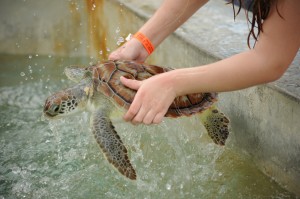Baby boomers were among the main driving forces behind the environmental movements that blossomed in the 1970s and beyond, and many baby boomers try to stay eco-conscious when they travel.
Eco-tourism is, in fact, a big force in the travel business, partly because baby boomers have embraced it so readily.
The last thing any of these boomers wants to do is unwittingly support a business that feigns eco-consciousness but is really the opposite.
The World Society for the Protection of Animals (WSPA) has some tips for recognizing supposed eco-tourist attractions that actually hurt animals and the environment in general. They have a colorful name for this deceitful practice: greenwashing.
They single out a popular attraction in the Cayman Islands, the Cayman Turtle Farm — which claims to focus on conservation of endangered sea turtles, but also sells them for food — but the tips could apply to any number of similar attractions around the world.
According to Elizabeth Hogan, oceans and wildlife campaigns manager at the WSPA, here are three red flags that may signal whether an attraction is greenwashing rather than really eco-friendly:
* Direct interaction with the animals. “As a general rule,” she says, “you shouldn’t be touching animals at an eco-tourist attraction.” Holding sea turtles — or the ever-popular swimming with dolphins — can “traumatize the animals and compromise their health,” she adds. You can also contract E. coli or salmonella yourself by touching sea turtles, for instance.
* A high entertainment to science ratio. If the attraction leans too heavily on entertainment as opposed to science, be skeptical. Trained marine mammal shows or snorkeling with turtles (such as at the Cayman Turtle Farm) may fall into this category.
* Farming is mixed with “conservation.” If the attraction sells the very animal for meat that it claims to be protecting, that’s a bad sign. The Cayman Turtle Farm, for instance, sells turtle meat to local restaurants.
To find out more about an attraction before patronizing it, Hogan suggests, do some Internet research to see what third-party groups have to say about it.
You can also ask questions of travel agents, cruise lines, and hotel concierges if they recommend visiting a particular attraction (or try to sell you a tour).
“Eco-tourism sounds good, it feels good, and people like the idea of making the world a better place while they’re on vacation,” Hogan says. “But it’s not that simple” to spot greenwashing — unless you know what to look for.
I hope cruise lines, tour operators, travel agencies, hotels and other travel purveyors will take these suggestions to heart. No one wants to harm the very animals or environment they think they’re helping to protect. I know baby boomer travelers don’t.
Be sure to download my free report, “How to Ride the Coming Wave of Boomers,” available here. It’s all about the best ways to market travel to baby boomers — the biggest-spending group of travelers the world has ever seen. It’s also the easiest way to subscribe to my blog, so you won’t miss a posting. Thanks!











Leave a Reply